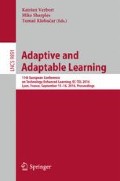Abstract
High-scale and pure online learning scenarios (like MOOCs) as well as blended-learning scenarios offer great possibilities to optimize the composition of learning groups working together on the assigned (or selected) tasks. While the benefits and importance of peer learning for deep learning and improvement of e.g. problem-solving competency and social skills are indisputable, little evidences exist about the relevant factors for group formation and their combination to optimize the learning outcome for all participants (in all groups). Based on the GroupAL algorithm, MoodlePeers proposes an plugin solution for Moodle. Evaluated in a four-week online university mathematics preparation course MoodlePeers proved significant differences in submission rate of homework, quality of homework, keeping up, and satisfaction with group work compared to randomly created groups. The significant factors from personality traits, motivation and team orientation are discussed as well as the algorithmic key functionality behind.
Access this chapter
Tax calculation will be finalised at checkout
Purchases are for personal use only
Notes
- 1.
See https://github.com/moodlepeers/. The acceptance in the Moodle plugin repository (http://moodle.org/plugins/mod_groupformation/) is currently in progress.
References
Damon, W.: Peer education: the untapped potential. J. Appl. Dev. Psychol. 5, 331–343 (1984)
Michaelsen, L.K., Fink, L.D., Hall, A.: Designing effective group activities: lessons for classroom teaching and faculty development. In: DeZure, D. (ed.) To Improve the Academy: Resources for Faculty, Instructional and Organizational Development. New Forums, Stollwater, OK (1997)
Srba, I., Bielikova, M.: Dynamic Group formation as an approach to collaborative learning support. IEEE Trans. Learn. Technol. 8(2), 173–186 (2014)
Harrison, D.A., Price, K.H., Gavin, J.H., Florey, A.T.: Time, teams, and task performance: changing effects of surface- and deep-level diversity on group functioning. Acad. Manag. J. 45, 1029–1045 (2002)
Humphrey, S.E., Hollenbeck, J.R., Meyer, C.J., Ilgen, D.R.: Trait configurations in self-managed teams: a conceptual examination of the use of seeding for maximizing and minimizing trait variance in teams. J. Appl. Psychol. 92, 885–892 (2007)
Bell, S.T.: Deep-level composition variables as predictors of team performance: a meta-analysis. J. Appl. Psychol. 92, 595–615 (2007)
Nederveen Pieterse, A., van Knippenberg, D., van Ginkel, W.P.: Diversity in goal orientation, team reflexivity, and team performance. Organ. Behav. Hum. Decis. Process. 114, 153–164 (2011)
Horwitz, S.K.: The compositional impact of team diversity on performance: theoretical considerations. Hum. Resour. Dev. Rev. 4, 219–245 (2005)
Konert, J., Burlak, D., Steinmetz, R.: The group formation problem: an algorithmic approach to learning group formation. In: Rensing, C., de Freitas, S., Ley, T., Muñoz-Merino, P.J. (eds.) Proceedings of the 9th European Conference on Technology Enhanced Learning (EC-TEL), pp. 221–234. Springer, Berlin, Graz, Austria (2014)
Zheng, Z.: A dynamic group composition method to refine collaborative learning group formation. In: Proceedings of the 6th International Conference on Educational Data Mining (EDM). pp. 360–361 (2013)
Cavanaugh, R., Ellis, M.: Automating the process of assigning students to cooperative-learning teams. In: Proceedings 2004 American Society for Engineering Education Annual Conference & Exposition (2004)
Isotani, S., Mizoguchi, R.: Theory-driven group formation through ontologies. Int. J. Comput. Collab. Learn. 4, 445–478 (2009)
Rammstedt, B., John, O.P.: Kurzversion des big five inventory (BFI-K): entwicklung und validierung eines ökonomischen inventars zur erfassung der fünf faktoren der persönlichkeit. Diagnostica 51, 195–206 (2005)
Hosiep, R., Paschen, M.: Das Bochumer Inventar zur berufsbezogenen Persönlichkeitsbeschreibung - 6 Faktoren. Hogrefe, Göttingen (2012)
Rheinberg, F., Vollmeyer, R., Burns, B.D.: FAM: Ein Fragebogen zur Erfassung aktueller Motivation QCM: A questionnaire to assess current motivation in learning situations. Diagnostica 47, 57–66 (2001)
Acknowledgements
This work has partly been funded by the TU Darmstadt Quality Program for excellent teaching. Additionally, special thanks to the co-workers on this interdisciplinary work, especially Regina Bruder, Annette Glathe, Christian Hoppe, Steffen Pegenau, Christoph Rensing, Diana Seyfarth, Marcel Schaub, Klaus Steitz, and Nora Wester (all TU Darmstadt).
Author information
Authors and Affiliations
Corresponding author
Editor information
Editors and Affiliations
Rights and permissions
Copyright information
© 2016 Springer International Publishing Switzerland
About this paper
Cite this paper
Konert, J., Bellhäuser, H., Röpke, R., Gallwas, E., Zucik, A. (2016). MoodlePeers: Factors Relevant in Learning Group Formation for Improved Learning Outcomes, Satisfaction and Commitment in E-Learning Scenarios Using GroupAL. In: Verbert, K., Sharples, M., Klobučar, T. (eds) Adaptive and Adaptable Learning. EC-TEL 2016. Lecture Notes in Computer Science(), vol 9891. Springer, Cham. https://doi.org/10.1007/978-3-319-45153-4_32
Download citation
DOI: https://doi.org/10.1007/978-3-319-45153-4_32
Published:
Publisher Name: Springer, Cham
Print ISBN: 978-3-319-45152-7
Online ISBN: 978-3-319-45153-4
eBook Packages: Computer ScienceComputer Science (R0)

